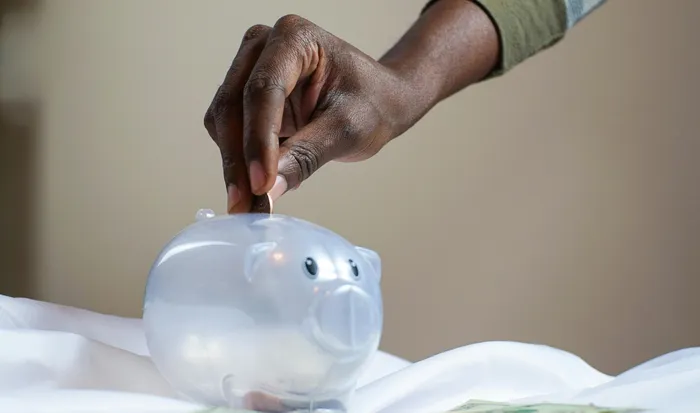
dramatic changes in saving money fail because they are too hard to sustain.
Image: File
SHERITHA thought R50 was nothing. Just the cost of a garage pie and cooldrink. But when she started automatically transferring R50 every single day into a separate account, something magical happened. Within a year, she had R18 250 sitting there - money she never even missed.
By year five, with compound interest, it had grown to over R120 000. That "meaningless" R50 became her house deposit. This is the power of micro-habits. Small, almost invisible changes that transform your financial future without disrupting your life today.
Most money advice asks you to completely overhaul your life: "Save 20% of your income!" "Cut out all luxuries!" "Invest R5 000 monthly!"
But here's the truth: dramatic changes fail because they are too hard to sustain. Your brain rebels against massive shifts. It's why gym memberships spike in January and crash by March. The secret? Start so small it feels almost silly.
Think of your finances like turning a massive ship. A tiny adjustment to the rudder, maintained consistently, eventually changes your entire direction. Here are the micro-adjustments that create macro-results:
- The daily R50 transfer
Impact: R18 250+ per year, automatically.
Set up a daily debit order for just R50 to a separate savings account. Most people spend this on snacks without thinking. But automated and invested, it becomes serious money.
Pro tip: Use TymeBank's GoalSave or Capitec's Goal Save - you won't even notice it's gone, but you will earn interest while it grows.
- The 24-hour purchase rule
Impact: Prevents thousands in impulse spending.
Before buying anything over R500, wait 24 hours. For items over R2 000, wait a week. You will be shocked how many "must-haves" lose their appeal.
Why it works: Your brain's desire for instant gratification fades quickly. That expensive gadget you "needed" yesterday often feels unnecessary tomorrow.
- The automatic 1% salary increase
Impact: Painless retirement wealth building.
Every time you get a salary increase, immediately boost your retirement contribution by 1%. You never feel the pinch because you never had that money in your pocket.
Start at 3% of salary. By the time you are earning decent money, you will be saving 10%+ without effort.
- The R20 coin jar digital version
Impact: R2 000 to 5 000 extra savings annually.
Round up every purchase to the nearest R10 and transfer the difference to savings. Buy coffee for R28? Transfer R2. Groceries for R847? Transfer R3.
Most banking apps can automate this. Discovery Bank and Standard Bank's "round-ups" make it effortless.
- The "pay yourself first" debit order
Impact: Guaranteed savings, no willpower required.
Set up your savings debit order for the day after payday - before you even think about spending. Start with just R200 if that is all you can manage.
The psychology: When money hits your account and immediately disappears into savings, your brain adjusts to living on what's left. You naturally spend less without feeling deprived.
Here is a micro-change most people miss: increase your excess by R1 000 to 2 000 on car and home insurance. Your premium drops significantly, often saving R200 to 500 monthly. Yes, you will pay more if you claim. But most people claim rarely, so you pocket the savings. Put that extra money into your emergency fund - you are essentially self-insuring for small incidents while saving on premiums.
R300 per month. That is all it takes to max out your Tax-Free Savings Account (TFSA) contribution over time. But here's the kicker - that R300, invested in low-cost ETFs and left untouched for 20 years, could grow to over R200 000, completely tax-free.
The magic number: If you can only save R300 anywhere, put it in a TFSA first. The tax savings compound dramatically over time.
Instead of trying to save R20 000 for emergencies (that feels impossible), start with this micro-habit: Every time you receive cash or coins as change, put it in a jar. When the jar fills up, bank it into your emergency fund. You will be amazed how quickly R50 and R20 notes accumulate.
Digital version: Use your bank's "pocket" feature to automatically save R5 to R10 from every transaction. It's so small you won't notice, but it builds your safety net automatically.
The biggest mistake people make is starting too big. R1 000 monthly savings feels responsible but often fails. R50 daily feels almost insulting but actually succeeds because it's sustainable.
Remember: You can always increase later. But you can't save from money you have already spent because your initial goal was too ambitious.
Pick just one of these micro-habits for the next 30 days:
- Week 1: Set up the daily R50 transfer.
- Week 2: Add the 24-hour purchase rule.
- Week 3: Start rounding up purchases.
- Week 4: Review your insurance excess options.
Don't try to fix everything at once. Master one tiny change. Let it become automatic, then add the next.
Financial freedom is not built through dramatic sacrifices or get-rich-quick schemes. It's built through boring, consistent, almost invisible daily choices that compound over time.The person who saves R50 daily will likely be wealthier in 20 years than the person who tries to save R1 500 monthly but quits after three months.
Start small. Stay consistent. Let compound growth do the heavy lifting. Your future self will thank you for the R50 you barely noticed today.
Ready to start? Pick one micro-habit and set it up right now - before you close this column. Small steps, taken today, become tomorrow's financial freedom.

Sanjith Hannuman
Image: File
Sanjith Hannuman is the managing director of Avinash Consultants & Actuaries.